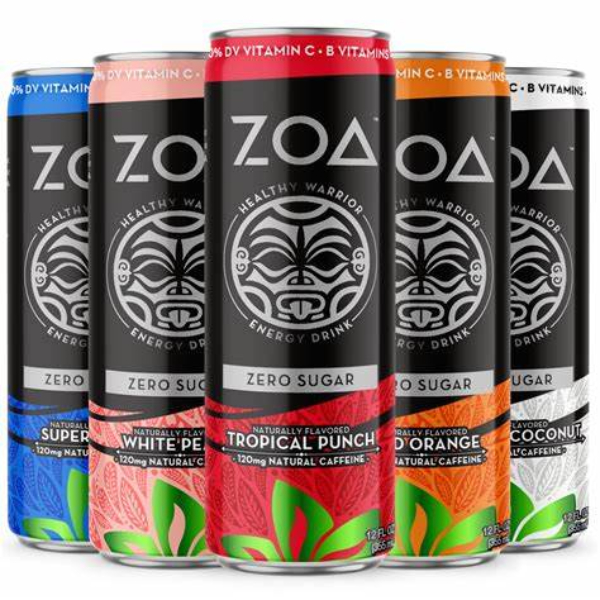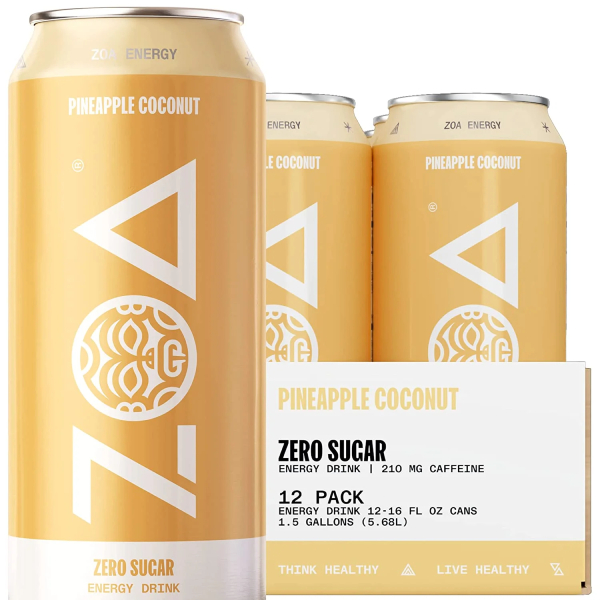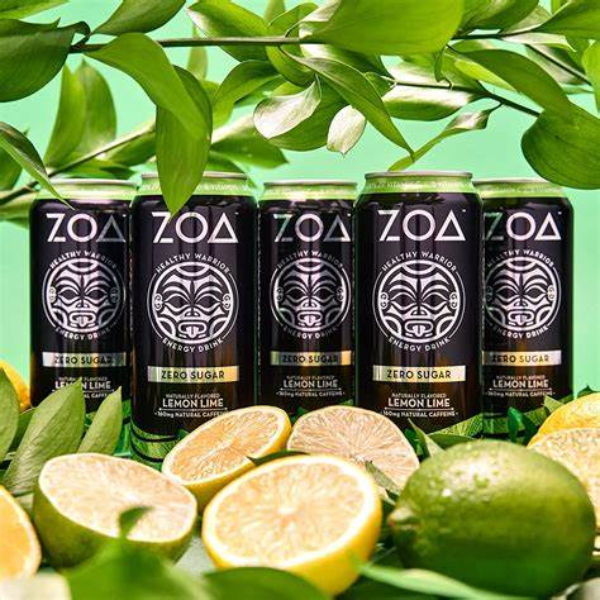Introduction to ZOA Energy Drinks
In March of 2021, ZOA Energy Drinks burst onto the scene. This new entrant aimed to carve out a unique space in the crowded energy drink market. Promoted as a ‘CLEAN & HEALTHY’ option, ZOA positioned itself differently, focusing on using natural ingredients and boasting a healthier profile than many mainstream choices.

Dwayne ?The Rock? Johnson’s Involvement
Retired wrestling superstar and actor Dwayne ‘The Rock’ Johnson doesn’t just endorse ZOA; he’s a co-founder. His involvement has brought significant attention to the brand. As a fitness icon, ‘The Rock’ embodies the image of health and energy ZOA wants to project, making him an influential figurehead for their marketing efforts. He actively promotes the energy drink, further claiming the benefits it provides for a demanding workout routine and intense lifestyle.
Nutritional Profile of ZOA
When evaluating ZOA Energy Drinks, it’s crucial to scrutinize their nutritional content. Understanding the caloric values and ingredients can help consumers make informed decisions.
Caloric Content and Sugar Levels
ZOA offers two main variants based on calorie content. The 100-calorie version, primarily sweetened with sugar, contains 23 grams of sugar per 16 oz can. This figure approaches daily sugar intake limits set by health organizations. There is also a 15-calorie sugar-free edition. However, this version employs artificial sweeteners like sucralose and Ace-K, which have raised health concerns. While the sugar-free option may appeal to calorie-conscious individuals, the safety of its sweeteners is debatable. The debate over harmful ingredients in energy drinks is particularly relevant when comparing ZOA’s sweetened and sugar-free versions, as the latter uses artificial sweeteners that may pose health risks despite being lower in calories.
Caffeine: Natural vs. Synthetic Sources
Caffeine is a fundamental component of energy drinks, and ZOA boasts 160 mg per can from natural sources. This level of caffeine provides a substantial boost without nearing the advised daily limit of 400 mg for adults. ZOA utilizes caffeine from green tea, which offers a steadier release of energy compared to synthetic counterparts. This can potentially minimize the abrupt ‘crash’ often associated with energy drinks. By choosing natural caffeine, ZOA aims to provide a smoother experience, avoiding the jitters thanks to the presence of L-Theanine in green tea. If you’re wondering how to quit energy drinks, consider opting for alternatives like ZOA, which offers a natural caffeine source that provides sustained energy without the harsh crashes or jitters associated with synthetic options.
Health Claims and Ingredients Analysis
ZOA Energy Drinks make several health claims, highlighting their natural ingredients and nutrients. Given the consumer interest in healthier options, it’s critical to dissect these claims.
Vitamins and Electrolytes in ZOA
ZOA boasts a broad spectrum of vitamins and electrolytes. These include vitamin C and B-vitamins like B6 and B2, which are known for their role in energy metabolism. Electrolytes, such as those present in ZOA, are important for hydration and muscle function. This combination aligns with the needs of an active lifestyle. Yet, it’s important to note whether such levels in ZOA truly make a significant health impact. When considering how long does it take for energy drinks to work, it’s essential to recognize that ZOA’s blend of vitamins and electrolytes may provide a quick boost for those leading an active lifestyle, but the actual health benefits can vary based on individual factors and consumption levels.

Presence of Branched-Chain Amino Acids (BCAAs)
ZOA Energy Drinks contain Branched-Chain Amino Acids (BCAAs), which are essential proteins. The drink includes 250mg of BCAAs in the form of leucine, isoleucine, and valine. While BCAAs support muscle recovery, the quantity in ZOA may not be enough to provide tangible benefits. Experts suggest a balanced diet usually covers BCAA needs without supplementation. Consumers should consider this when evaluating ZOA’s health benefits.
Controversy Over Artificial Sweeteners
The ingredients of an energy drink play a crucial role in its health implications. ZOA Energy Drinks offer a sugar-free version that stirs debate due to its use of artificial sweeteners. Preferences for low-calorie alternatives often lead brands to include such sweeteners, but at what cost to health?
Concerns with Sucralose and Acesulfame Potassium
Two artificial sweeteners in ZOA’s sugar-free option, sucralose and Acesulfame Potassium (Ace-K), have caused unease among health-conscious consumers. Although these sweeteners reduce calorie content, studies suggest potential risks. Research on sucralose indicates possible harm to gut bacteria and a higher cancer risk in animal models. Ace-K, also present in other diet beverages, may have links to cancer, thyroid problems, and brain function changes. While these studies don’t conclusively confirm danger in human consumption, they warrant caution and further investigation. Consumers must weigh these concerns when considering are ZOA energy drinks healthy, and whether the trade-off for lower calories is worth it.
Consumer Experience with ZOA Energy Drinks
When considering are ZOA energy drinks healthy, the consumer experience is just as important as the ingredients list. People look for an energy drink that not only promises health benefits but also satisfies in taste and effectiveness.
Flavor Profiles and Variety
ZOA Energy Drinks come in multiple flavors, offering a range for different palates. The flavors available aim to cater to those who prefer classic tastes as well as adventurers seeking something new. For example, the original flavor has been described as akin to Red Bull but without the sharp aftertaste, providing a unique option in the crowded market of energy drinks. ZOA’s commitment to natural caffeine sources can influence the flavor profile, giving it a distinctive edge over competitors.
Personal Accounts of Energy and Performance
Consumers often share their experiences with the drink’s impact on their energy levels and workout performance. Many report that ZOA provides a needed boost without the harsh crash commonly associated with energy drinks. This is attributed to the use of natural caffeine from green tea. However, some have mentioned the need to monitor heart rates during intense workouts, indicating that while ZOA can enhance endurance, it’s vital to consume it responsibly. Personal reviews suggest that while ZOA has not turned anyone into ‘The Rock’ overnight, it does offer support for those looking to sustain energy during demanding activities.
Comparisons with Other Energy Drinks
When comparing ZOA Energy Drinks to others, several factors stand out. Let’s explore how ZOA compares to market giants and niche players.
How ZOA Stacks Up Against Competitors
ZOA’s unique proposition reflects its natural ingredient list, including green tea caffeine and essential vitamins and electrolytes. While competitors like Red Bull and Monster may offer a similar energy boost, ZOA differentiates itself with its cleaner caffeine source, potentially leading to a smoother energy experience without the jitters.
Mainstream energy drinks often rely on synthetic caffeine, which can provide a rapid energizing effect, but this can also lead to an equally rapid crash. ZOA claims a steadier release of energy due to its natural caffeine, aiming for sustained performance. Still, it’s important for consumers to consider the relatively high sugar content in the full-calorie version or potential concerns with artificial sweeteners in the sugar-free version.
In terms of taste, ZOA aims to compete by offering a more natural flavor without the stark aftertaste associated with many energy drinks. This can appeal to those who are put off by the strong, sometimes medicinal flavors of other options.
As for health benefits, while some competitors focus on high sugar or artificial additives for flavor and energy, ZOA emphasizes its vitamins and electrolytes, suggesting a more beneficial health profile. Yet, as noted, ZOA’s sugar-free version does include controversial sweeteners like sucralose and Ace-K, which are also common in other diet energy drinks.

In essence, ZOA holds its ground in the energy drink market by promoting natural ingredients and healthier formulations. However, consumers must make the final judgment on whether ZOA’s health advantages outweigh any potential downsides, particularly when compared to other popular and readily available energy drink options.
Conclusions
After exploring various aspects of ZOA Energy Drinks, we’ve delved deep into their nutritional profile, health claims, controversial ingredients, and consumer feedback. Now it’s time to weigh the pros and cons to conclude on the question: Are ZOA energy drinks healthy?
Weighing the Pros and Cons
Let’s start with the benefits. ZOA prides itself on natural caffeine from green tea, which provides a steady energy release. This means you may avoid the sudden crash that synthetic caffeine in other energy drinks might cause. The presence of vitamins, such as vitamin C and B-vitamins, along with electrolytes, support overall health and can be advantageous for those with an active lifestyle.
However, issues arise with ZOA’s sugar content in its 100-calorie variant, nearing daily sugar intake limits. Alternatively, the sugar-free version carries risks with artificial sweeteners like sucralose and Ace-K, which have been linked to health concerns in some studies. Despite the inclusion of BCAAs, their low quantity in ZOA might not be sufficient to render significant benefits.
In terms of flavor, ZOA offers a variety that caters to different preferences without the strong aftertaste found in other drinks. Consumers report a favorable energy boost, but caution is advised regarding heart rate during intense exercise.
Against other competitors, ZOA stands out with its natural ingredients. Yet, mindful consideration of sugar and artificial sweeteners is necessary. Ultimately, the decision to choose ZOA as a healthy energy drink option depends on individual health priorities and how one balances the potential benefits with the discussed drawbacks.